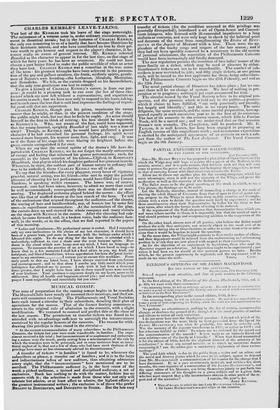CHARLES KEMBLE'S LEAVE-TAKING.
THE last of the KEMBLES took his leave of the stage yesternight. The retirement of a veteran actor is, under ordinary circumstances, an event in theatrical annals ; but in the instance of CHARLES KEMBLE, the only one remaining to us of a family that have become illustrious by their histrionic talents, and who have contributed no less by their pri- vate worth to give honour and respect to the player's character, it be-
comes really an event of general interest. Mr. KEMBLE selected Benedick as the character to appear in for the last time, on that stage of
which for forty years he has been an ornament. He could not have chosen a part better fitted to make the public sensible of what an actor they have lost. CHARLES KEMBLE was a comedian in the true sense of the term : his greatest triumphs have been achieved in the persona. tion of the gay and gallant cavaliers, the frank, soldierly spirits, gentle- men of Nature's own breeding—the Lotharios, Mirabels, Mercutios, and Benedicks. We felt, as the curtain dropped on his farewellsbow, that the only true gentleman was lost to comedy.
To give a history of Cuaasus KEMBLE'S career, is from our pur- pose : it would be a pleasing task to run over the list of those cha- racters which are now left without a representative, and expatiate on his merits in each ; but we have now only to respond to his leave- taking, and in such cases the less that is said best expresses the feelings of regret- ful good-will that are uppermost.
CHARLES KEMBLE, though past his prime, terminates his career sooner than he might, or than, in the present condition of the stage, the public might wish, but not than he feels he ought. An actor should himself be the first to think of retiring: his loss should be regretted, as KEMBLE'S is. Who, not aware of the fact, could have supposed, that the young-hearted, sprightly Benedick of last night was a man of sixty? Though, as KEMBLE said, he would have preferred a graver character if he had consulted his personal feelings, his spirit never seemed more buoyant, his manner more free, light, and easy. It was as if the flame of his stage-life were blazing its brightest before the green curtain extinguished it for ever. When we say that the animal spirits of the drama's life have de- parted with CHARLES KEMBLE, we do not forget the manly seriousness of energy and feeling that informed his graver personations ; such, for example, as the latest creation of his talent—C14tbrd, in KNOWLES'S Hunchback, that play in which his daughter gathered her greenest laurels. Whenever, in short, the noblest part of human nature in ordinary life was to be embodied, there CHARLES KEMBLE was all in all.
To say that the friends—for every playgoer, every lover of vigorous, graceful, natural acting, was his friend—who met to enjoy the painful pleasure of cheering his last performance, would have filled two Covent Gardens, is speaking within compass. The house was, of course, crammed : care had been taken, however, to admit no more than could be well accommodated; consequently there was no disorder or mur- muring. The displaced orchestra played behind the scenes : the effect was like that of muffled drums at the last march of the hero. To tell of the enthusiasm that reigned throughout the audience—of the shouts, the waving of bats and handkerchiefs, nay, of bonnets too by some fair ones—is superfluous commonplace. At the termination of the play, the curtain drew up and showed the whole company and many visiters on the stage with KEMBLE in the centre. After the cheering had sub- sided, he came forward, and, in a broken voice, bade the audience fare- well, in the words, or to the effect, that we find reported in the papers of this morning.
r! Ladies and Gentlemen—My professional career is ended. Had I consulted only my own inclinations in the choice of my last character, it should have been of a graver !cast, and more in harmony with the feelings under which I laboured this night. To do any thing for the last time, is attended with a melancholy, sufficient to cast a shade over the roost buoyant spirits. How dense is the cloud which now hangs over my mind, I have no language to express. To renounce the practice of an al t which I have loved so long—to know that in a few moments I shall bid a final adieu to you, my kind, my indulgent, and liberal benefactors, whose approbation has been the:great incite- ment to my exertions I entreat you to excuse this weakness. From early youth to this my latest hour, I have always received from you favour and encouragement ; and to that alone I ascribe any little merit which your indulgence has allowed me to possess. I only wish it had been a thousand times greater, that I might have been -able to show myself more wore worthy of your kindness. Your goodness is engraven deeply on my heart, never to he obliterated. May all health and happiness attend you; and with this heartfelt prayer I most respectfully and mournfully bid you adieu."


























 Previous page
Previous page